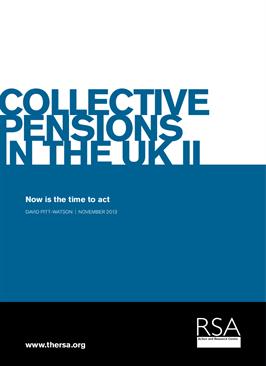This paper offers a unique evaluation, supported by modelling by Aon Hewitt, showing how collective pensions would have performed over the past 57 years. It concludes that they would have given a 33 percent better outcome as an individual pension and would have given a more predictable pensions.
If a typical young Dutch person and a typical young British person were both to save the same amount for their pension, if they were to retire on the same day, and die at the same age, the Dutch person is likely to get a pension which is at least 50 percent higher. One reason for this is that in Holland, pension saving is typically done collectively.
The current system of individual private pension savings in the UK doesn't work. Savers are left with an uncertain future, their retirement income dependent on the market, and fees taking up to 50 percent of the total savings pot. We need an urgent solution to this crisis.
The solution to the pensions crisis in the UK could be straightforward - to introduce a well-regulated framework for collective pensions. The RSA has campaigned for the past three years for the introduction of collective pensions in Britain. They provide better outcomes to savers, with higher and more predictable pensions.
Others have joined the RSA in its call for collective pensions. They include the CBI, the TUC, the National Association of Pension Funds and the Association of Member Nominated Trustees. We believe this strong consensus between stakeholders gives a unique moment to introduce collective pensions in the UK. British people should be allowed to save for retirement through collective pensions, just like people in Holland, Denmark, parts of the United States, Canada and Sweden.This paper sets out the case urging the government to legislate to make collective pensions possible in the UK within an appropriate regulatory framework.
The Department of Work and Pensions has agreed with these findings, now is the time for them to act. British people should be allowed to save for retirement through collective pensions, just like people in Holland, Denmark, parts of the United States, Canada and Sweden.This paper sets out the case urging the government to legislate to make collective pensions possible in the UK within an appropriate regulatory framework.
Safeguards are needed for the establishment of a Collective Defined Contribution (CDC) pension system.
-
Trust: If people are to be persuaded to place their money in a pool with others, they need to know that those who are managing the money will have the savers’ interests in mind at all times.
All collective pension systems need to be directed by trustees; that is, people who have no interest or ability to profit at the expense of the beneficiaries. Of course such trustees may hire fund managers and others to manage the money, but the final decisions need to be taken by a group which can always be trusted to act in the beneficiaries’ interest.
Collective pensions need good communications and should as far as possible set out guidelines about how the trustees would intend to deal with unexpected events.
-
Clarity, in particular legal clarity, is also required by the sponsor of any CDC pension. It is unlikely that sponsors will be found for collective pensions unless there is absolute clarity on the nature of the promise made, which legislators cannot then change.
-
Collective pensions need to be run with adequate expertise and investments, charges, custodial and other arrangements put in place to ensure good practice, just as they are with other pension options.
pdf 230.6 KB
Contributors


Be the first to write a comment
Comments
Please login to post a comment or reply
Don't have an account? Click here to register.